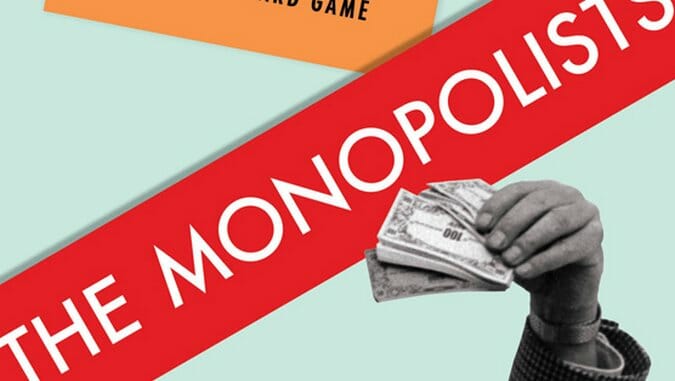The Monopolists by Mary Pilon

“Another case of Monopoly-related violence, Chief.”—Officer Lou, The Simpsons, episode 276, “Brawl in the Family”
“How do those Parker Brothers sleep at night?”—Chief Wiggum, ibid.
For a deep dive into industrial and pop culture apocrypha, the true importance of Mary Pilon’s investigation into the origins of the most culturally significant board game of the modern era—and one could certainly make the case that Monopoly has chess in check—is fittingly buried deep. In her source notes, Pilon flatly relays the true reason for the preceding 260 pages; The Monopolists is not simply an attempt at delivering, at long last, proper due to the enterprising players who gave rise to one of the most powerful American icons. It is also to engender “the conversation about the ownership of ideas, the evolution of innovation in this country,” which, if one allows her to do just that, leaves one feeling as distraught as Springfield’s suilline top cop.
Jobless, hopeless Charles B. Darrow creates a diversion for his and his family’s bleak, Depression-mired existence, has it picked up by Parker Brothers, both bathe in cash as the nation around them turns to dust—and that Alger-esque origin story whispers to something deep inside of us. Monopoly—on our shelves, on our phones, on our french fries—is far from a simple game. Those color coded properties and prismatic notes, the top hat and race car and thimble and scottie dog, are interactive shorthand for the uniquely American pursuit of success, one unencumbered by class—after all, cannot the threadbare shoe be the last player left?
To secure its place in the national religion, Monopoly had to undergo a brutal rise which was a perfect reflection of its gameplay; dressed up by Darrow—who, it should be noted, did finally monetize the damn thing—Monopoly would have to be protected. Parker Brothers swiftly purchased the game’s competition and variants, smothering all rivals in cash or court and absorbing all history pre-Darrow, the dangerous history, laying singular claim not only to the game but to the gameplay itself.
And were it not for an anti-monopolist San Francisco State economics professor, the myth would have most likely remained history.
![]()
Ralph Anspach, sick of the Me-Generation solipsism of the 1970s, hit upon the idea of creating a monopoly-deriding game whilst playing the original one night with his family (that an econ professor, even one as Anspach, would own Monopoly is a given). He designed a game wherein trust-busting was the goal, dubbed Anti-Monopoly, and began to gain traction in the historically left-leaning Bay Area, aided by the terrifying economic milieu.
The game came to the attention of Parker Brothers, who ordered Anspach to cease and desist his usage of the word “monopoly;” the lawyers helpfully offered, via an article, the substitute titles Anti-Trust and Trust-Busting. Anspach believed that the commonality of the word “monopoly,” well ensconced in the minds and vocabularies of the public long before its eponymous board game, was critical to the game’s easy and effective communication with consumers and that he had the same right.
Winning a court case would require Anspach to prove, among other things, that his title did not cause confusion between his product and Parker’s, and his legal strategy, in a delicious twist, involved looking to nail the Cardboard Empire (Pilon’s coinage, gratefully borrowed here) for violating antitrust laws, in essence having Monopoly declared a monopoly.
Had these been Anspach’s only recourses of action, it is likely that he would have lost. Darrow would still be widely considered the inventor of the game, and Pilon would not have a book to write. Luckily, industriousness requires resources, and the professor’s son Mark—reading a book they had purchased whilst making Anti-Monopoly, Marvin Kaye’s A Toy is Born—stumbled across an entry about a precursor to Monopoly: The Landlord’s Game, patented by one Lizzie J. Magie decades before Darrow’s depression era-patent. It was the key to ending Parker Brothers’ reign.
-

-

-

-

-

-

-

-

-

-

-

-

-

-

-

-

-

-

-

-

-

-

-

-

-

-

-

-

-

-

-

-

-

-

-

-

-

-

-

-








































